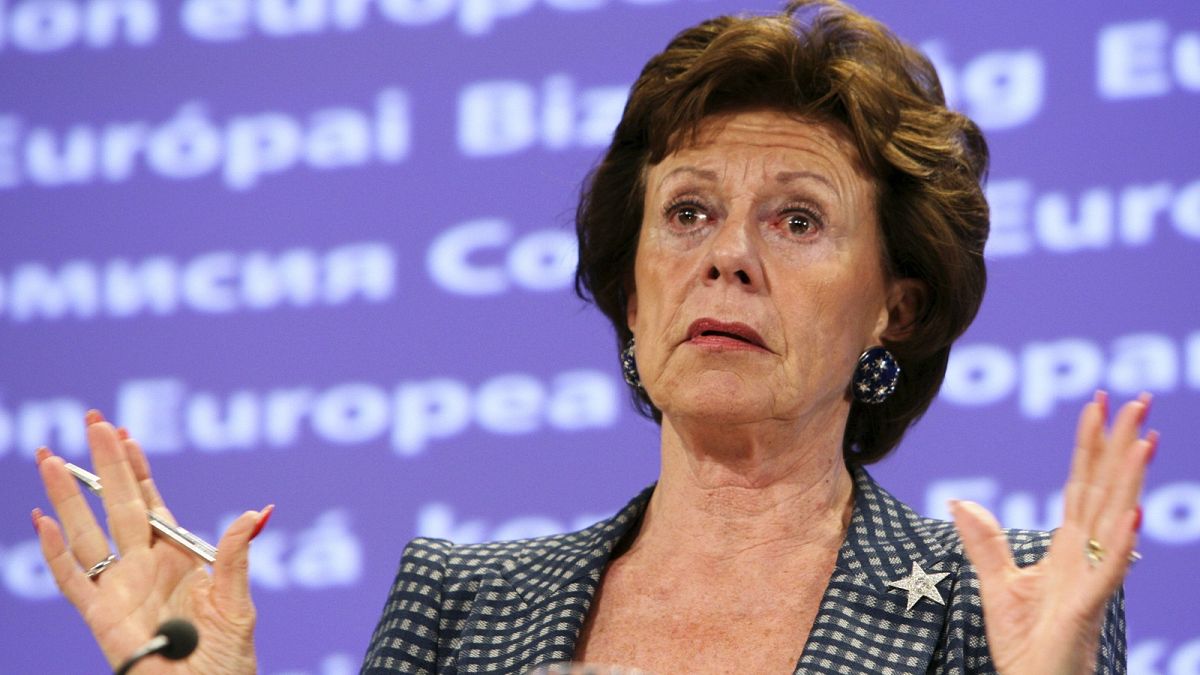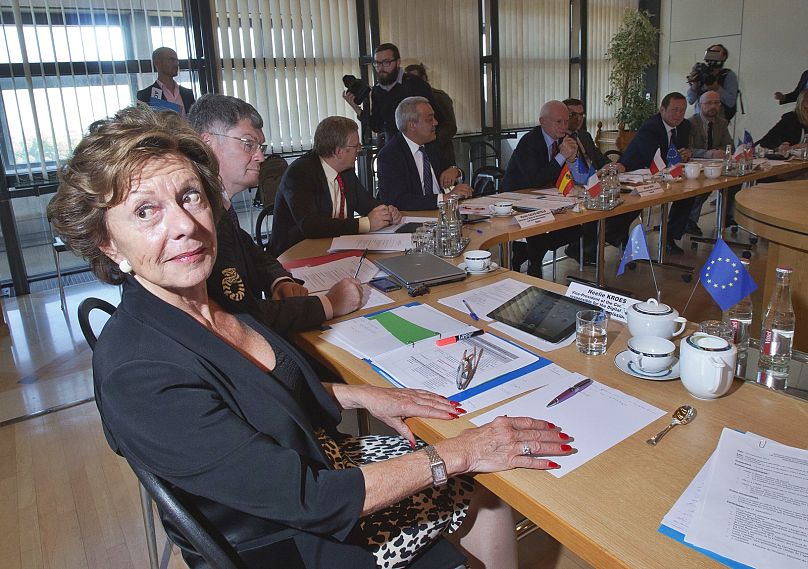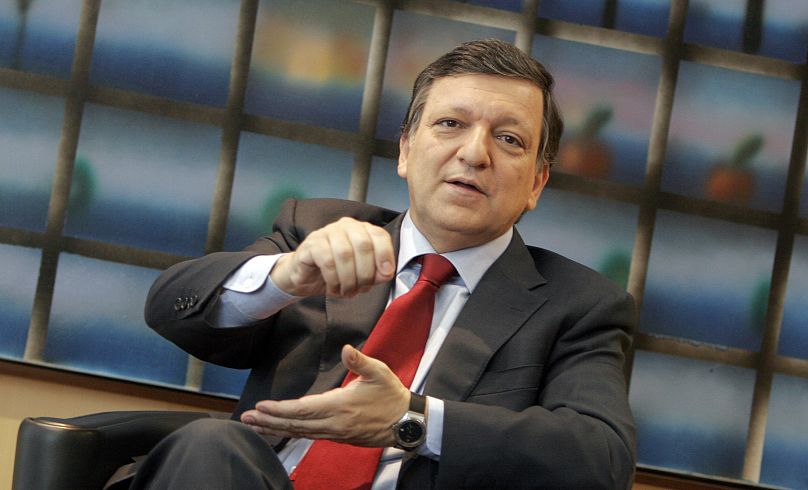The leaked documents suggest Neelie Kroes overstepped her duties as EU Commissioner by lobbying in favour of Uber.
A new scandal of revolving doors has erupted in Brussels.
The Uber Files, a massive cache of leaked texts, emails, invoices and other internal documents, has exposed the extent to which the ride-hailing service aggressively lobbied top government officials with the aim to relax labour laws and thwart upcoming regulations.
The behind-the-scenes campaign took place as the transport app evolved from a disruptive tech start-up to a multi-billion dollar operation with an indisputable grip on the market and a ubiquitous presence in thousands of cities around the world.
The unprecedented stash of files – over 124,000 documents spanning the period between 2013 and 2017 –were first leaked to the British newspaper The Guardian and were then shared with the International Consortium of Investigative Journalists (ICIJ).
Among the high-profile characters enmeshed in the controversy is Neelie Kroes, a Dutch liberal politician who served as European Commissioner for a full decade under the leadership of President José Manuel Durão Barroso.
Kroes first held the powerful position of Commissioner for Competition between 2004 and 2010, acting as the bloc's top regulator for business mergers, state aid and antitrust investigations.
At the start of Barroso's second term, she was named Vice-President in charge of digital agenda, a post she used to promote non-discriminatory Internet access, a new cyber-security strategy and the creation of digital jobs for the millions of Europeans who were unemployed in the aftermath of the 2008 financial crisis.
Kroes left her Brussels job in November 2014, when the whole college of commissioners was renewed after the European Parliament held elections and Jean-Claude Juncker arrived at the helm of the executive.
According to the Uber Files, the following year, Kroes asked the European Commission for special permission to take up a well-paid position on the Uber advisory board.
'Her name should never figure on a document'
For Kroes, getting the green light from Brussels was an indispensable step because the job offer surfaced during the so-called "cooling-off" period.
This interval prevents former top EU officials from engaging in professional activities, paid or unpaid, that entail "lobbying or advocacy vis-à-vis" the Commission and its multiple services.
At the time Kroes put forward the request, the period was set at 18 months after leaving office. The period was later extended to two years for commissioners and three years for the president.
When the job offer under consideration involves activities related to the Commissioner's former portfolio, the request has to be examined by an independent ethics committee. The three-person panel issues a non-binding opinion which helps the college of commissioners make a final decision on the issue.
The Uber Files indicate Kroes received a negative response from the committee in late 2015 and that she personally pleaded with then-President Juncker to obtain the necessary dispensation, an effort that also failed.
The information was confirmed by a Commission spokesperson.
"In November 2015, the Committee recommended not to authorise the activity (an analysis shared by the Secretariat-General of the Commission at the time)," the spokesperson told Euronews.
"Subsequently, President Juncker informed Ms Kroes of these developments and asked her to withdraw her notification. Ms Kroes eventually withdrew her notification in December 2015."
However, the leaks reveal that, throughout the cooling-off period, Kroes tried to lobby the Dutch government of Prime Minister Mark Rutte to have the police "back off" from an investigation into Uber's Amsterdam office.
"Our relationship with NK [Neelie Kroes] is highly confidential," wrote Mark MacGann, Uber's chief lobbyist in Europe at the time, in an email to his colleagues, leaked as part of the Uber Files. "Her name should never figure on a document."
The email was dated March 2015, just four months into the former commissioner's 18-month-long cooling-off period, suggesting a rapport closer than previously known.
In May 2016, when the period was near expiration, Kroes told an Uber executive that she was trying to arrange a meeting between the company and an unnamed EU Commissioner. The leaks also show she helped Uber meet with Rutte himself.
In response to the allegations, Kroes denied any wrongdoing.
"Consistent with my ethical duties as a former European Commissioner, I did not have any formal nor informal role at Uber before May 2016," she told The Guardian.
Once the time limitations were lifted, Kroes took up the position at the Uber advisory board, with a reported $200,000 annual salary. She left the board in 2018.
"Since this period, we have implemented new guidelines for our teams in Europe, which govern lobbying and external engagements with policymakers, strengthening our requirements and oversight of those activities," Uber said in a statement.
A Commission spokesperson said the executive had sent Kroes a letter demanding clarifications about her actions and noted it was too early to draw further conclusions.
'Laissez-faire approach to revolving doors'
Beyond the charges levelled at Kroes herself, the latest revelations raise serious questions about the European Commission's code of conduct, its effectiveness and its overly flexible application.
The code, amended for the last time in 2018, compels commissioners to "devote themselves fully" to their duties, respect the "dignity" of their office and avoid any potential conflicts of interest. It prohibits external professional activities for the duration of their mandates and restricts participation in national politics.
Importantly, the code bounds commissioners to Article 245 of the EU treaties, which commands "integrity and discretion" in their behaviour – both during and after their term of office.
The cooling-off period adds a new layer of responsibility designed to mitigate the phenomenon of revolving doors: EU Commissioners have access to confidential and highly sensitive information, as well as first-hand knowledge of the machinations and power balance that shape EU politics.
These insights make commissioners the first target of lobbyists, consultants and other business associations trying to advance their interests in Brussels and secure concessions from policymakers.
Civil society organisations have for years raised the alarm about the scale and frequency of this trade-off and the extremely fine line walked between the public and private sectors.
Since October 2014, Brussels has green-lighted over 130 professional petitions from Commissioners during their cooling-off periods. A handful of requests were filed while the officials were still in office.
In the case of Kroes, a former Commissioner in charge of digital regulation, the revelations about her alleged connections with Uber, a digital company, constitute a "shocking exposé," says Vicky Cann, a researcher at Corporate Europe Observatory, a non-profit organisation that monitors corporate lobbying in EU policy-making.
"A Commissioner’s responsibility to act with 'integrity and discretion' is not time-limited, and should have prevented this scandal," Cann said in a statement.
"Meanwhile the case also illuminates the laissez-faire approach of the Commission to revolving doors and conflicts of interest."
Transparency International was equally critical about the "clandestine lobbying" and called for an urgent probe to shed light on the allegations and the potential breach of Article 245.
"What the Kroes scandal makes clear once again is that the current self-policing system of ethics for present and former Commissioners isn’t fit for purpose," the organisation said.
Problematic appointments
The Uber Files are another chapter in a long list of dubious and problematic appointments that have seen former Commissioners take up lucrative opportunities in the private sector shortly after leaving office.
For instance, public records show the Commission authorised a total of 15 requests from Günther Oettinger – who served as a Commissioner from 2014 to 2019 – during his two-year cooling-off period.
These included positions at the German branch of Deloitte, the strategic communications firm Kekst CNC and the real estate company CG Elementum AG.
Oettinger even launched his own consulting firm – "Oettinger Consulting" –, which he registered before receiving the executive's final approval.
Following an opinion from the ethics committee that noted the company's scope was "very broad and unspecified," the Commission endorsed the enterprise but established a series of obligations and restrictions to ensure Oettinger refrained from exploiting confidential information or lobbying top officials.
The case of José Manuel Durão Barroso attracted more attention and criticism.
The former Commission president made headlines in July 2016 when he was appointed non-executive chairman of Goldman Sachs International (GSI).
Although the assignment took place at the end of Barroso's cooling-off period, the news sparked outrage in and outside Brussels. French President François Hollande called it "morally unacceptable" while MEPs asked the European Ombudsman for an inquiry into what they saw as a revolving door scandal.
The Ombudsman, Emily O'Reilly, later said Barroso's move caused "serious public disquiet" and undermined the public image of the EU institutions. She also asked the ethics committee to re-examine the case.
For his part, Barroso blamed the outrage on Europe's "negative attitude" against "everything that comes from the United States of America."
Neelie Kroes now finds herself under similar scrutiny.
According to the records, the Commission authorised three requests made by Kroes during her cooling-off period: special adviser to Bank of America Merrill Lynch, non-executive member of the management board of the Open Data Institute, and special envoy for start-up companies in the Netherlands.
The three positions were approved by the executive, provided Kroes respected the "protection of collective responsibility and confidentiality" related to the matters she covered in her two terms as Commissioner.
Speaking to The Guardian, Kroes defended her job as start-up envoy and dismissed fears of overlap, saying she was "required to interact with a wide array of business, government and non-governmental entities, with the aim to promote a business-friendly and welcoming ecosystem in the Netherlands."
In 2015, Uber enjoyed a valuation that exceeded $50 billion, a pipe dream for a start-up.
The Dutch Ministry of Economic Affairs neither confirmed nor denied reports that Kroes pushed the government to advance Uber's interests in the country.
"It is not part of the Special Envoy's responsibilities to approach ministers or senior officials in favour of large corporations," a spokesperson from the ministry told Euronews.
The Commission said the ethics committee's negative opinion about Kroes's attempt to join the Uber advisory board could not be made public because she withdrew her notification before the full process ended.
In a letter addressed to President Juncker and leaked by the Uber Files, Kroes expressed her disappointment and frustration regarding the committee's rejection.
"It is my opinion," she wrote to the president, "that only a revision of the Code of Conduct could confirm the strict, but unlawful, interpretation made by the Ad hoc Ethical Committee."


